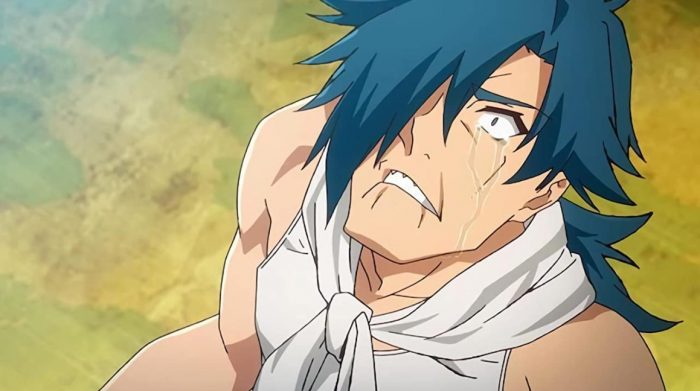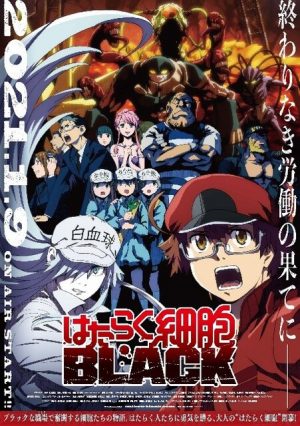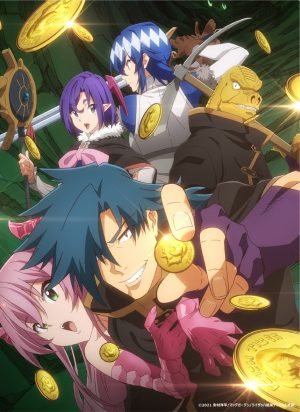
You’ve probably heard of black companies mentioned in a few anime. One series this season, Meikyuu Black Company (The Dungeon of Black Company) to be specific, even makes this kind of employment its primary theme. This, of course, is not the first time anime has shed light on this issue. Cells at Work! CODE BLACK depicts the body of an unhealthy human as a very toxic workplace for cells. Even though it’s not directly described as a black company, the working environment and conditions are pretty much the same as a black company. There is also Zom 100: Bucket List of the Dead, a manga series yet to be adapted into anime. It more specifically depicts the working condition of a black company during its initial chapters. It shows how much the employees are physically exploited, while also being put in constant mental and psychological stress.
The issue of black companies, however, is a more grave issue in Japan than what’s depicted in these series. Here’s why.
There’s Always a Twist in These Series
The thing about series, both manga and anime, tackling black companies is that there’s always another entertaining twist. In Meikyuu, the twist is the fact that it’s set in a fantasy world and his workers, we can only assume at this point, will be non-humans. Meanwhile, both Cells at Work! CODE BLACK and Zom 100 have comedic scenes in order to lighten up the gloom. This, of course, is highly understandable since a huge chunk of the target audience would find such a heavy theme boring. That, in the entertainment business, is a big no. It may be understandable, but it doesn’t remove the fact that it waters down the seriousness of the issue. That being said, just how serious of an issue is it actually?
The Coining of the Term
The term first arises during the early 2000s. IT employees coined the term and turned it into a meme. The internet then caught wind of it, which gave rise to its fame. Exploitative working conditions, however, exist not just in the IT industry, so the term has been used to collectively describe exploitative corporations. In 2009, a film titled “A man on the verge at a BLACK company” came out, which further spread the term’s popularity. That’s why a group sharing the same advocacy formed a committee in 2012, which also started the Black Company Awards. It may sound like a comedy stunt or a joke, but the committee honestly aims to advocate awareness and bring companies’ inhumane working conditions to light.
The sad thing is that it’s not just one or two companies, there literally were and are a slew of black companies in Japan. As such, the nominated companies are exceptionally heinous even for a black company. The winners are also not just chosen by a panel. The masses themselves get to vote annually on which corporation is the most evil among them all.
It’s Literally Modern-Day Slavery
To give a clear picture of how bad the working environments in these companies really are, let’s take Watami Foodservice Co., the first winner of the Black Company Award, as an example. In 2008, an employee, who we opt not to name, commits suicide after being employed by Watami. Even though the company can’t be held responsible for it since it’s suicide, investigation shows that the employee logged 141 unpaid overtime hours, though some believe that it’s more than what the record shows. Worse is that said employee has only been employed by the company for one month. During that month, she may have also experienced constant verbal abuse. To make matters worse, Miki Watanabe, Watami’s founder, is said to send messages that instigates suicide to his employees, especially during payday.
Other black companies aren’t any better. Black company employees usually have long underpaid shifts or overtime, suffer from verbal abuse, and are even instigated to commit suicide. Female employees also often face sexual harassment in the office.
Government Crackdown
With such a serious problem in its backyard, the Japanese government has already made its move. In 2013, the Labor Ministry took another look at the country’s labor laws and examined thousands of companies. The ministry has also been keeping a close eye for such violations. One notable attempt back in 2017 is the ministry naming and shaming companies that have violated labor laws. The list included even big-name companies like Dentsu and Panasonic.
Final Thoughts
It’s great to see social issues being tackled by both anime and manga since both media have huge audiences. It is, however, important to take such information with a pinch of salt. After all, anime and manga’s primary goal is to provide entertainment. That being said, make sure to do further research to get a full grasp of the facts. Hopefully, this article helped achieve that, even if just a tiny bit.
Recommended Post
Cells at Work! CODE BLACK's Red Blood Cell Has Finally Broken
Recommended Post
Hataraku Saibou Black (Cells at Work! CODE BLACK)
Recommended Post





